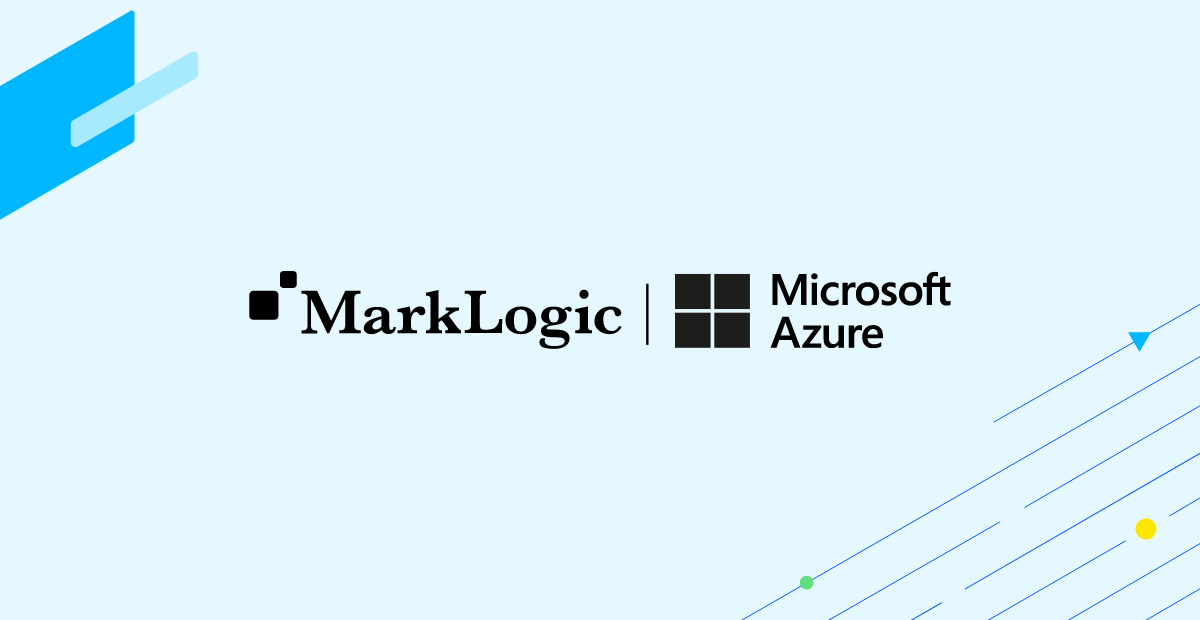MarkLogic Data Hub Service is the fastest and the most cost-effective data hub for securely integrating data across an enterprise. With the latest release, Data Hub Service (DHS) is now also available on Microsoft Azure. Customers now have the option to deploy Data Hub Service on the two leading public cloud platforms, AWS and Azure, and get the same set of benefits, capabilities, and service level agreement.

As a serverless, fully-managed cloud data hub, Data Hub Service makes it easy for customers to migrate their data integration workloads to the cloud and run transactional, operational, and analytical applications at scale for a predictable cost.
Agile Data Integration for 10x Faster Results
Data Hub Service is a single, purpose-built service for agile integration of multi-structured data. It gives you the flexibility to load data as is and use an iterative model-driven approach to harmonize and master data without having to compromise on security and governance. This makes it faster to deliver data services for applications and promptly respond to changing business needs. Using this iterative approach, called data services first, our customers experience 10x faster results in contrast to traditional ETL for data integration.
Data Hub Service provides the end-to-end data curation and data exploration tooling, to configure a data hub for progressive data harmonization. These point-and-click tools make it easy for all users, developers and non-developers, to participate in the data integration lifecycle.
Data Hub Service is designed to integrate seamlessly with AWS and Azure platform services. With the latest release, it seamlessly integrates with various Azure services like Active Directory, Logic Apps, Key Vault, etc. Hence, customers can leverage their Azure investments to integrate Data Hub Service into their enterprise data architecture. Using Azure services, customers can easily onboard users, manage user authorizations and encryption keys, and build cloud-native applications, workflows, and pipelines that orchestrate data integration workloads and data services on Data Hub Service.
Predictable and Low Cost
Data Hub Service offers consumption-based pricing based on cloud credits. The pricing is all-inclusive, bundling together hardware, software, provisioning, operations management, and 24/7 support. The pricing is also simple – you pay for compute, storage, and data transfer (or bandwidth fee charged by AWS or Azure).
With the latest release, Data Hub Service offers a new low-cost service tier for batch data integration workloads. It is intended for running ad-hoc, intermittent workloads and development or test instances that don’t require 24×7 availability and auto-scaling. The low-cost service tier provides fixed compute capacity for a very low price and is billed based on usage. As an example, you can provision Data Hub Service for 8 MCUs in the Azure US East region and run batch jobs for 5 hours/day with a storage footprint of 32 GB for a low monthly cost of $94 (excluding data transfer fee).
For data integration workloads and applications that require continuous availability and auto-scaling, customers will continue to use the Data Hub Service standard service tier. This service tier offers free bursting (or auto-scaling of compute) to handle demand spikes and customers can get upfront savings when buying compute credits in bulk. The service accumulates up to 12x of your unused compute credits that are utilized during bursting at no extra cost. This results in substantial savings as you don’t have to provision capacity for peak usage and also avoids costly billing due to auto-scaling when a demand spike happens.
Both the standard and low-cost service tiers of Data Hub Service provide the same data hub capabilities for integrating data from silos but with different service level agreements. By providing the two service tiers, customers can better optimize their spend by matching workloads to the right service tier.
Unified Architecture for Operational Simplicity
Data Hub Service is a full-stack enterprise data integration platform with none of the operational burden. Its unified architecture results in faster time-to-market and lower TCO than stitching together your own data hub solution.
Built on MarkLogic Server, it provides a full suite of capabilities for data ingestion, data curation, semantic enrichment, data exploration, data security and governance that makes it fast and easy to create durable data assets for multiple use cases and personas. It independently scales operational, analytical, and data integration workloads, and storage for high performance and reliability. And, it supports industry-standard APIs and languages, so you can quickly build apps and do rich analytics.
To build a similar data integration architecture, you would have to stitch together multiple cloud services, including an ETL tool, document database, graph database, search engine, MDM tool, and more. Operationalizing and maintaining this data integration architecture is more expensive. It requires running more services, which increases your infrastructure footprint (like data duplication, backups, etc.), DevOps complexity, and governance challenges (like fragmented security policies, disjoined lineage, etc.).
In contrast, the unified architecture of Data Hub Service brings operational simplicity and increases productivity to build a trusted integration hub. It tracks data and metadata together through the integration lifecycle so you can govern and secure it all in one place.
Learn more
To learn more, please visit the MarkLogic Data Hub Service page and sign-up for the product demo.

